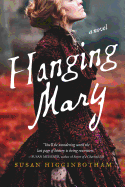
Susan Higginbotham (Her Highness, the Traitor) turns to the American Civil War with this historical novel about Mary Surratt and her young boarder, Nora Fitzpatrick. Told from the alternating perspectives of both women, Hanging Mary is Higginbotham's account of their world in the days following President Lincoln's assassination.
As the war nears its end, Mary, a widowed mother of three, is running a boarding house in Washington, D.C. She is a Confederate sympathizer, and her son, Johnny, is an active secessionist who falls in with John Wilkes Booth and becomes a messenger for the Rebel cause. Soon Johnny's cohorts, including Booth, are regular fixtures at the Surratt house.
Nora is recently out of convent school. She lost her mother at a young age, and Mary serves as her surrogate; Nora even contemplates matching her widowed father with her. Despite Nora's loyalty to the Union--she reads to injured soldiers at the local hospital--she is devoted to this woman who provides a welcome maternal presence in her life.
When John Wilkes Booth assassinates Abraham Lincoln, Booth's routine presence at Mary's boarding house leads investigators to suspect all of the residents in the unthinkable crime that rocked the nation.
Hanging Mary is well researched, but the novel's greatest quality is its empathetic narrators, especially Nora. Her passion and self-sacrifice create a humanizing view of some of U.S. history's greatest villains. In Higgenbotham's hands, this little-known woman is heroic and riveting. --Jen Forbus of Jen's Book Thoughts

